Military postal service during the Great Patriotic War
The government was well aware that in order to maintain the emotional spirit of the fighters at the proper level, it is necessary to ensure the smooth operation of the post. The bulk of the soldiers were driven not only by the desire to defend their homeland and free it from the hated occupiers, but also by the desire to protect the most expensive people who were somewhere far behind or in the territory already captured by the enemy. The leadership of our country realized that one of the most important tasks at the most terrible, initial stage of the war was the fight against confusion and panic, which swept millions of Soviet citizens. And considerable support and confidence to the fighters, in addition to ideological propaganda, can be provided by an established connection with the house. The newspaper “Pravda” in August 1941, in one of its editorial articles, wrote about how important the front-line mail service is for the front, since “every received letter or package gives the fighters strength and inspires new feats”.
After the introduction of martial law in the country, the poor organization of the communications service was revealed, which could not adequately ensure the timely delivery of even the most important messages and letters to the dispositions of army units. Stalin called the connection the “Achilles heel” of the Soviet Union, noting at the same time the need to raise it to a whole new level as a matter of urgency. Already in the first days of the war he called the USSR People's Commissar I.T. Peresypkina for a report on the developed urgent measures to transfer state communications to martial law. And for this, a radical restructuring of all available means of communication, including mail, was necessary.
The changes were primarily due to the fact that when delivering letters to the front, there was no usual mailing address for the postman, indicating the street and the house. It was necessary to develop completely new principles for the operation of the post office, which would allow quickly and accurately deliver the correspondence to military units whose location was constantly changing. Nevertheless, due to the importance of the ability to quickly and remotely address issues related to troop control, telephony and radio were given priority in the modernization of communications.
The head of the communications department of the Red Army, Gapich, was removed from his post by Stalin, and all his duties were assigned to Peresypkin, who now held two posts at once: the head of communications of the army and the deputy people's commissar of defense, while remaining the people's commissar of communications. This decision was quite natural. Being an energetic and strong-willed person, the new thirty-nine-year-old communications director was also a skillful and competent organizer. It was he who proposed, contrary to accepted norms, to call in the army of civilian specialists who were assigned urgently to organize the unsatisfactory work of the military postal service.
It is not known how successfully the new staff would have coped with the tasks assigned to him if it were not for His Majesty the Case: during one of the military operations, the charter of the field postal service of the German troops fell into the hands of the Soviet military. And since the postal security of the Wehrmacht has always been at the proper level, the translation and study of such a valuable document allowed us to successfully use the technology of the enemy for the needs of the Soviet army in a few weeks. However, the use of a well-developed German model did not eliminate purely Soviet problems. In the first weeks of the war, postal workers were faced with the banal problem of lack of envelopes. It was then that triangle letters, folk letters appeared, when a sheet with a letter was simply folded several times, and the recipient's address was written on the upper side. These famous symbols of hope and a strong connection of the front with the rear were often mentioned by the authors of works on the Great Patriotic War. The war did not take away from people the desire to continue to live and love. About dreams and hopes that everything will work out, and life will re-enter the usual channel and they wrote in their letters.
The address on the letter, which was to be delivered to the front, at the beginning of the war was written as D. K. A. - The current Red Army. Then the number of the teaching staff or field post station, the number of the regiment and the place of service of the soldier were indicated. Over time, the use of such a system of addresses has shown that there is a possibility of disclosing the location of existing parts and divisions. The post captured by the enemy close to the location of the Soviet military groups provided him with all the information about the place of their deployment. This, of course, was unacceptable. According to the order of the People's Commissar of Defense, a new instruction was adopted on addressing postal correspondence for the Red Army during the war period. After the abbreviation D.K.A. and the PPS numbers began to indicate the special conditional code of the military unit, which was known only to those who read the order for assigning the corresponding number to a specific military unit.
The private life of Soviet citizens and before the war was the subject of close state control, and wartime did not affect the current state of affairs. Just the opposite. All mail was carefully checked, censorship was total, the number of censors doubled, and each army had at least ten political controllers. Private correspondence of native people was no longer their personal matter. The inspectors were interested not only in the data contained in the letters on the deployment of units and their numbers, the names of the commanders and the number of casualties, but also the emotional mood of the soldiers of the active army. It was not by chance that postal censorship during the war years was directly subordinated to SMERSH, the General Directorate of Counterintelligence in the USSR Defense Commissariat. One of the most "soft" types of postal censorship was the deletion of lines containing inadmissible for transmission, in the opinion of the auditors, information. Crossed out obscene language, criticism of the army order and any negative statements about the situation in the army.
The censors at the post office were mostly girls, and it often happened that from the letters strange pictures of young handsome fighters disappeared. Thus, abusing their service opportunities, the girls started mailing novels with reporters they liked. War is war, and youth took its own. Dating by correspondence has become commonplace, in the newspapers it was possible to find the addresses of those who would like to correspond with the soldier. Excluding individual cases, as a rule, the continuation of these virtual novels was postponed until the end of the war.
It is also interesting that in the war years, letters to the front sometimes reached faster than today. This was due to the fact that the People's Commissar of Communications has achieved exceptional conditions for the delivery of army mail. No matter how tightly the railway was circled, the postal echelons were passed in first and foremost, and their stops were considered unacceptable. In addition, the mail was transported using all available modes of transport, depending on the terrain conditions - in special mail cars, on ships, mail planes, cars, and even motorcycles. The use of mail transport for any other needs was strictly prohibited. Along with the combat support of the army, military mail was given priority.
The Soviet military sometimes managed to intercept postal cargo for the German army. A careful study of the letters of the enemy soldiers indicated that the bravura mood of the German army that reigned in the first year of the war after the cold of the winter of 1941 and 1942 was replaced by a feeling of anxiety and insecurity. In his spare time, the political directors organized a massive reading of German letters, which gave the Red Army soldiers additional strength and confidence in the success of their good deed.
In addition to delivering letters to the mail Aviation The mission was to distribute campaign leaflets, which were supposed to affect the psychological mood of German soldiers and undermine faith in the convictions inspired by the command. A huge “ideological machine” worked on the content of the leaflets. An excellent example is the leaflet “Saving Germany in an Immediate End to the War”, written by the chairman of the Presidium of the Supreme Council and at the same time, the talented propagandist Mikhail Kalinin, who possessed an exceptional gift of persuasion. The Germans, for their part, also periodically dropped leaflets or stuffed cartridges with them and fired in the direction of the Soviet trenches. Quite often, these pieces of paper were printed on good quality tissue paper in the expectation that some Russian soldier would certainly pick it up for a cigarette and read it, of course.
The main number of postmen or freight forwarders, as they were then officially called, were men. It was no coincidence, since the total weight of the load, which they had to carry, was in addition to the usual uniforms of the many letters and newspapers and was almost equal to the weight of the machine gun. However, the burden of the cherished bag of the postman was not measured by kilograms of letters, but by the human emotions and tragedies that came with them.
The appearance of the postman in each house at the same time waited and feared, because the news could be not only good, but also tragic. Letters in the rear became practically heralds of fate, each of them contained the answer to the most important question - is the one alive who is expected and loved alive? This position imposed on the carrier news special responsibility, every postman every day had to experience both joy and grief, along with their addressees.
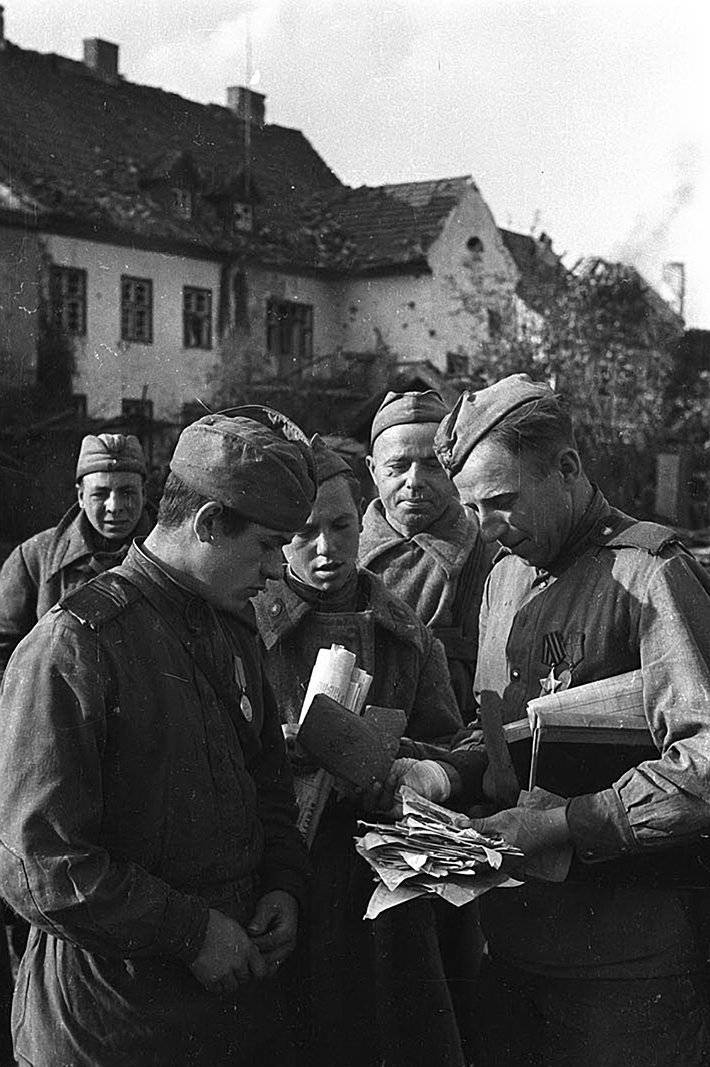
An interesting phenomenon that has spread among the Soviet soldiers, became the "clerks". Not all military personnel could write a letter to his beloved girlfriend or mother in a competent and beautiful way. Then they turned for help to more prepared and educated comrades. In each part there were experts recognized and respected by all, from whom it was possible to take a sample letter or ask to dictate its text live.
By the end of 1941, the Soviet military post had already worked as a well-established mechanism. Up to seventy million letters were delivered to the front each month. Staff postal sorting points worked around the clock to avoid interruptions and delays. However, they sometimes did happen if the military unit retreated or was surrounded. It also happened that the letters died along with the post echelons or disappeared without a trace in the bag of the postman who was killed during their delivery. But in most cases, all efforts were made to ensure that each letter reached its addressee as quickly as possible, even if it is located in a temporarily besieged area.
February 6 1943 year, all military units and their units were assigned new reference numbers. Now the postal address of the front-line soldier consisted of only five digits: the numbers of the military unit and field mail. As the Soviet troops moved westward in each conquered area, it was necessary to restore the postal service. Fortunately, during the war years the mechanism was worked out to perfection, and most importantly there were high-class communication specialists.
After the 1 of December 1944, the Red Army crossed the USSR border and the war was nearing its end, the State Committee of Defense adopted a special decree according to which all members of the active army were allowed to send a fixed weight package once a month. In just four months 1945, the post office was able to deliver ten million parcels to the rear of the country, which required more than ten thousand two-axle postal carriages to be transported. Most soldiers sent home clothes, dishes and soap, and the officers could afford to send more valuable "souvenirs". When at the post offices began to accumulate a whole mountain of undelivered parcels, the government decided to introduce additional postal-baggage trains. Today it is difficult to imagine with what feelings the residents of the rear, exhausted by years of hardship, hurried to the post office to receive parcels with truly royal gifts, among which the most valuable were the dry rations of American soldiers, consisting of canned food, jam, egg powder and even instant coffee.
After 8 in May in European time by 22.43 Germany signed an act of surrender, the mail had to endure one last “fight”. A tsunami from greeting letters and postcards literally overwhelmed all the post offices of our country. People were in a hurry to share their joy with the world. At times it was simply impossible to cope with such a powerful stream, and mountains of unsorted letters accumulated at postal stations, reaching the addressees with a big delay. However, as life gradually began to return to a peaceful course and new post-war worries and problems appeared, the postmen ceased to be objects of universal attention, and when they appeared, people did not fall silent waiting for the unknown ...
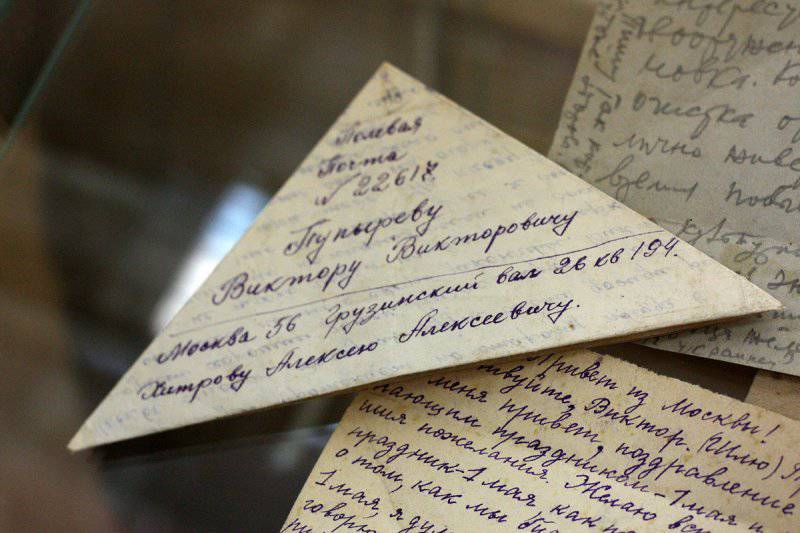
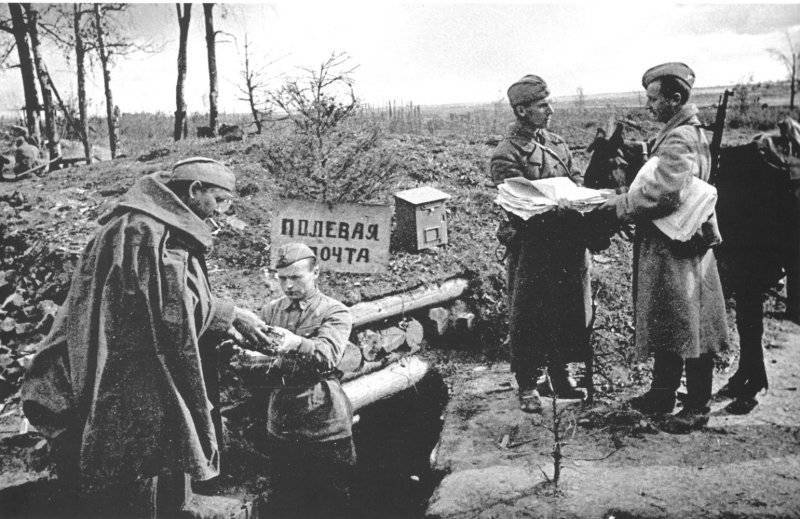
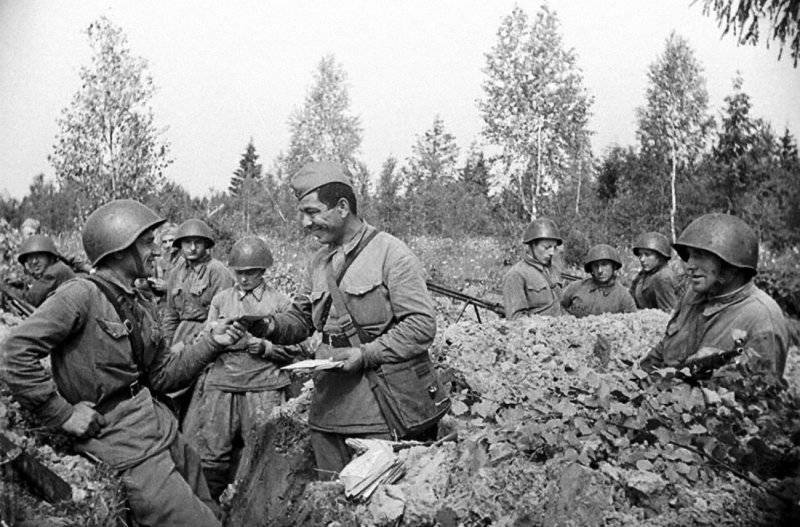
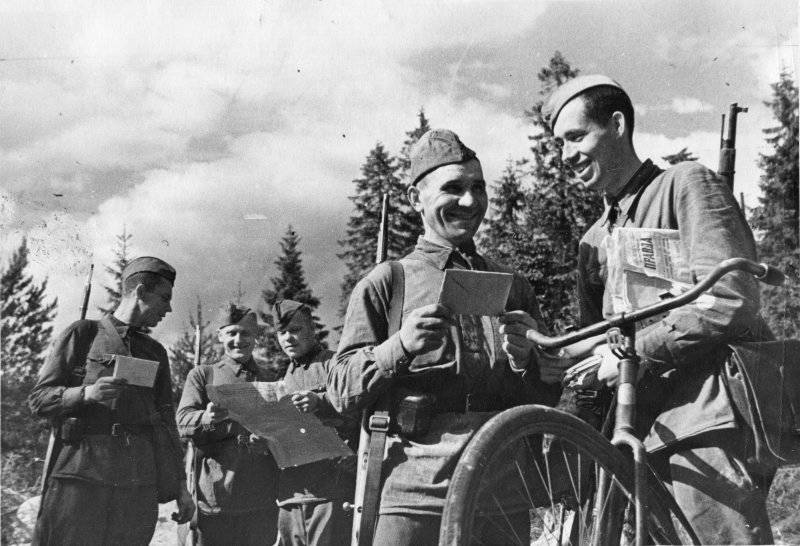
Information